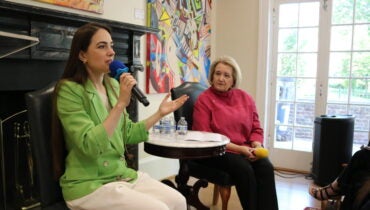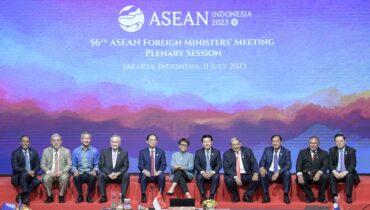Trump’s executive orders temporarily banning immigrants from certain predominantly Muslim countries claim to ‘protect’ women. In fact, they endanger them.
In both orders, Trump directs the Department of Homeland Security to collect and publish data on “the number and types of acts of gender-based violence against women, including so-called ‘honor killings,’ in the United States by foreign nationals.” This provision bolsters the false narrative that such violence is endemic to Muslim countries and cultures. There is not a single country that is immune from gender-based violence, and the United States is no exception. According to the Center for Disease Control and Prevention, over one third of women in the United States have been raped, assaulted, or stalked by an intimate partner. This violence is perpetrated by people of all colors, ethnicities, and socioeconomic backgrounds. Trump’s executive order creates a false nexus between immigration to the United States and gender-based violence. Victims advocates from over 50 organizations sent a letter to the Trump administration attesting to the danger of spreading these myths, declaring the ban to be “out of sync with the reality” that violence against women crosses cultural and state barriers.
Despite the Trump administration’s supposed intention to keep women safe, the ban will have a disproportionate impact on women. In discussing the need for an immigration ban to prevent terrorist attacks on the United States, Trump has mainly referred to male immigrants: he’s talked about the need to stem the influx of “young, strong men” coming to the United States and tweets about “bad dudes” allegedly infiltrating our borders. Despite this rhetoric, most refugees coming into the United States are women and children. According to United Nations data, nearly 75% of the 4.9 million registered Syrian refugees are women, children, and the elderly. These are individuals who are least likely to cause a threat, yet they are banned from U.S. entry under both of Trump’s executive orders.
Women often seek refuge in the United States to escape gender-based violence in their home countries. In Central America, thousands of women flee their homes to escape sexual violence and domestic abuse perpetrated by their spouses, boyfriends, gang members, and drug cartels. In Myanmar, women are repeatedly raped by military forces as armed conflict continues in the country’s borderlands.
Things are no different in the countries affected by Trump’s travel ban. Women refugees from Libya report that sexual violence is so commonplace that they preemptively take contraceptive pills in anticipation of rape. In ISIS-controlled areas in Syria, women are barred from going to school, holding jobs, and appearing in public without male guardianship. Some are sold to ISIS fighters who use them as sex slaves in the name of “God’s will.” In Somalia, young women are often forced to undergo female genital mutilation (FGM), and women in camps for internally displaced persons (IDPs) are particularly vulnerable to rape, forced marriage, and abduction.
If women attempting to flee their countries are turned away by the Trump administration, the violence against them will likely continue. In the words of Akbar Shaid Ahmed from the Huffington Post, “[c]easing to issue visas or grant refugee status to displaced people seeking safety in the U.S. could greatly increase the odds that they’ll face exactly the kind of violence the Trump administration says it wants to prevent.”
Other policies of the Trump administration similarly disregard the needs of sexual and gender-based violence survivors and the health of women around the globe. Trump’s 2018 federal budget completely eliminates funding for the Legal Services Corporation, which provides free legal services to indigent and low-income victims of domestic abuse. Since women are more likely to receive protection orders against their abusers when they have representation by counsel, the elimination of the Legal Services Corporation could have dire consequences for women’s safety. Trump’s budget also proposes cuts to the Departments of Justice and Health and Human Services, which if adopted, could mean rollbacks on programs that serve victims of domestic violence under the Violence Against Women Act (VAWA). This means cuts to shelters, law enforcement training on domestic violence, and prevention efforts.
Trump also signed an executive order reinstating and strengthening the “Global Gag Rule,” which prohibits overseas global health organizations that receive federal funding from providing, advocating for the legalization of, or even referring to abortions. This means that non-governmental organizations will either be forced to comply – invariably leading to a spike in dangerous self-performed abortions – or will have to forgo federal funding, which would drastically reduce their ability to provide contraceptives, HIV screenings, and other important services. Ironically, it is access to family planning that reduces the number of abortions.
On March 15, a federal judge in Hawaii temporarily blocked Trump’s revised travel ban. The ban also faces legal challenges from seven other states. However, the temporary blockade is no guarantee that Trump’s travel ban won’t ultimately prevail; nor does the judge’s order prevent Trump from drafting yet another executive order to keep immigrants out.
We need to call out the Trump administration for its false claims to protect women from Muslim immigrants. If the president genuinely wants to stem violence against women, he should retract his travel ban, which could cost women their lives.
About the Author
Holly Fuhrman is the 2016-2017 Hillary Rodham Clinton Law Fellow with the Georgetown Institute for Women, Peace, and Security. She received her Juris Doctorate from Georgetown University Law Center in 2016 and her Master’s in Public Policy from Lehigh University in 2013. During her time at Georgetown Law, Ms. Fuhrman served as Committee Chair for the Refugee Assistance Project (RAP) and as an Articles Editor for the Georgetown Journal of International Law (GJIL). She has also held legal internships at DC SAFE, the American Bar Association Commission On Domestic & Sexual Violence, Human Rights First, and the American Immigration Council. During her third year of law school, Ms. Fuhrman was a student-attorney in Georgetown’s Center for Applied Legal Studies, where she successfully pursued her client’s asylum claim at the Baltimore Immigration Court.

